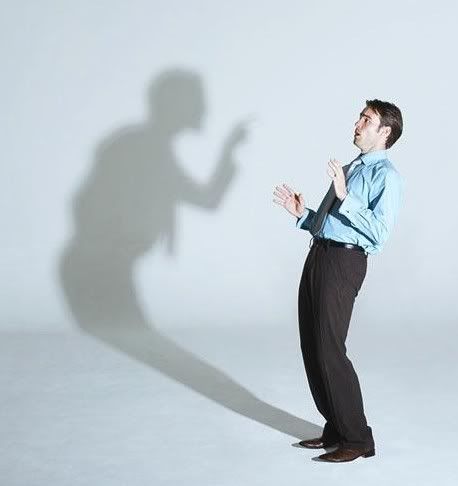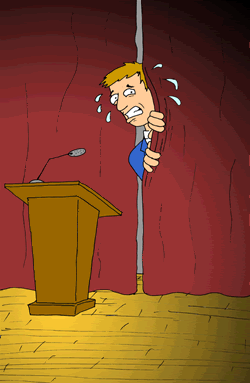So, the fear of public speaking is not a fear of speaking, it’s a fear of being humiliated and ridiculed. That is what we fear more than death. Unfortunately, what we fear most, we tend to draw to us. It happened to me years ago. Let me tell you the story.
I was attending a weekend workshop with a public speaking teacher from the west coast. He had talked at another seminar I’d been to the previous month, so when I learned that he was coming to New York, I jumped on the chance to see him more “up close and personal.” Once there, I found myself immediately wanting to impress him [self-importance leads to fear, see previous post]. I knew I was pretty good in front of an audience (even before I learned the New Paradigm techniques I teach today) and I wanted to prove that to him. In addition, someone else was in attendance whom I wanted to impress. Can you see it? I was doomed before I even began because I was focused so narrowly on myself, out of feelings of insecurity.
We were told, once in the seminar, that over the next 48 hours, we would be giving a 20 minute speech for critique. It could be on any subject. As the hours passed, I began to panic. I had no idea what to talk about; I was in the midst of changing the direction of my business and had no strong thoughts formulated yet that could be worked into a speech. I began to over-think and “downshift.” Downshifting is when we move out of our frontal lobes, where we do our higher-thinking processing, and shift down into the old “reptilian” part of the brain, where there is little thinking, only emotion. By Sunday afternoon, I was fully downshifted when it was my turn to speak.

In that state—with a topic I’d conjured just a few minutes before my turn–I gave an interactive presentation that went beyond the scope of a traditional speech. The teacher, who had become a friend and was, as I said, someone I wanted to impress, hated it and held nothing back in a scathing attack that left me—it felt at the time—stripped of dignity.
There is no question: I was humiliated. I experienced the nightmare everyone tries to avoid when they avoid speaking: public ridicule.
I left the seminar room for sometime that afternoon and when I returned, I was greeted by compassion and warmth from my peers, but the flame of embarrassment burned all else away.
I tell you this story for a few reasons. One is that it illustrates a powerful force: the self-fulfilling prophecy. This is, I believe, the only reason we will ever actually get ourselves into a humiliating situation: we have all but “ordered it” from the ethers. The fact is, I was so afraid of making a mistake in front of those two idols of mine that I had no choice but to do just that. And what is at the core of these self-fulfilling prophecies? Once again, much too much self-attention. Needing our “self” to be perfect, admirable, important, respected. What we “need” too much, we will destroy.
So, a vital step to being at ease with an audience is reducing your own importance. I help my students move from being speakers to teachers because when we’re teachers, who is important? The ones in the seat, not the one on the stage. Second, you want to acknowledge your neediness because it will sabotage you if it stays unconscious. With awareness, you can summarily dismiss it. The bottom line is, you can only “think yourself” into disaster.
I also tell you this story to make this critical point: Despite that weekend debacle, I teach presenting and speaking skills, and most think I’m pretty good. That weekend didn’t break me. It didn’t diminish me, either. Why? Because I didn’t let it (after a day of processing it, that is.). I experienced everyone’s worst-case public speaking fiasco—but I decided what it meant about me and about my future. The event itself—and the man who critiqued me—had no power to determine that. It was up to me.
And that is the point I want to drive home: nothing can humiliate—or break—you without your consent. You may one day be in a situation as “bad” as the one I was in. If you have a message in you; a business dream to fulfill; change you want to see…you must be willing to let the “worst” happen, knowing it won’t damage you unless you let it.
Years ago, as an empowerment coach, when I felt deep resistance and fear in my clients, I would have them consider their most dreaded future experience, and then have them say aloud, “I am willing to have _________ happen.” They usually choked it out, but they said it. And I would probe deeper: “Why are you willing to have it happen?” And their answer (with my coaching) was, “Because there is nothing I can’t handle.”
And that’s the truth. You can handle any humiliation. Know that. Claim it. Stop stifling your vital communication out of the idea that you will die if you make a mistake. Not only did I not die, I went on to become a teacher of public speaking.
Fear of public speaking is not the problem; it’s a symptom of the problem, which is the belief that you can be damaged and diminished by someone else or by an event. As long as you believe that, there will be many things you will not do. Public speaking will just be one of them. And day by day, you will leak away the power vested in you to reach your highest potential.
So, I encourage you to do something scary. Tell yourself, “I am willing to be humiliated in front of a group of people.” And ask yourself, “Why are you willing?” You will answer, “Because there is nothing I cannot handle.”
Lizabeth, you may ask yourself, isn’t that creating a self-fulfilling prophecy?? The answer is no. A self-fulfilling prophecy occurs because of fear and resistance—both of which are, unfortunately, magnets for drawing just what you don’t want. Allowing the possibility of humiliation because you know you can handle it comes out of a deep inner power. Very, very different.
There is nothing more important than your voice. Do not allow anything to silence it. Ever.





